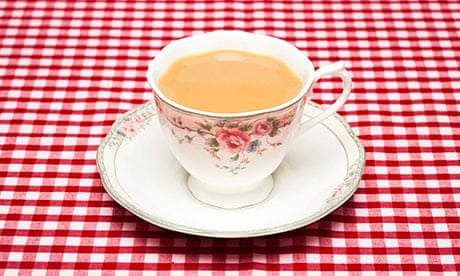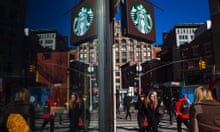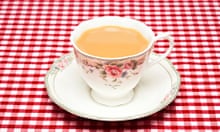Cut me and I bleed tea. Strong builder's, dash of milk, no sugar. So the news that tea sales are in hot water, while Nescafé – Nescafé, for the love of all that is holy – is growing in popularity is not easy to swallow.
Research by the Grocer shows that volume sales of shop tea are down by 6% in the past 12 months, while supermarket Nescafé sales have increased by 6.3%. Every year, home coffee systems such as Nespresso gain more willing disciples. We are in danger of becoming a nation of coffee drinkers. Some think we have been seduced by the sweet, milky depths of American coffee culture, and it's easy to see how. Exotica from restaurant menus eventually filter through to the home front – why should drinks be different?
If our out-of-home habits do have an influence on what we choose to brew indoors, the reason for tea's decline seems as clear as a Jing teapot. Having never had a culture of domestic milky drinks-making (cocoa doesn't count), our coffee habits have been shaped by the pints of cappuccino and calorie-dense gingerbread-flavoured cream-topped nonsense peddled by the big coffee chains. It's almost all we've ever known: for takeaway coffee – we have always been in the hands of chains such as Costa. Judging by their success we are (connoisseurs and expat Antipodeans excluded) prepared to stay in their expensive embrace. We will drink whatever they make us, and be glad of the chance.
Tea is a different matter. We have more exacting standards. Every British tea drinker who is in possession of both hands and a kettle has spent years perfecting their ideal method. Couples can spend a decade learning how to brew for their mutual delight. Tea is best made by you or someone you have trained. It's not the kind of thing I'm willing to entrust to a half-awake barista with a paper cup and a heavy plastic jug of – shudder - full-fat milk; I'd rather drink a coffee or (almost) a Peanut Hottie.
But not all tea has suffered the same fate. One brand, Yorkshire Tea, has bucked the trend; their stats show a 6.8% increase in volume sales, which can't all be down to Russell Crowe. Sam Ward, of parent company Taylors of Harrogate agrees that the standard black tea market is in decline. But she says it's not coffee that's to blame. "We're moving more towards a cafe culture, but I don't think that coffee is necessarily affecting the market to the detriment of tea – people are just buying different types of tea. The standard black tea market is in decline mainly because people are putting different things, like green and herbal tea, into their baskets. Tea companies are increasing their offerings left, right and centre – they're looking to widen their nets."
Frankly, if you are foolish enough to enjoy the musty waft of herbal tea, then you're welcome to it. The same goes for the bitter reproach of instant coffee. For each person who walks past the builder's towards the chamomile or the coffee powder, there's one more box of bags on the shelf for those of us who know the true strength of tea. Will you raise your mug to that?




Comments (…)
Sign in or create your Guardian account to join the discussion